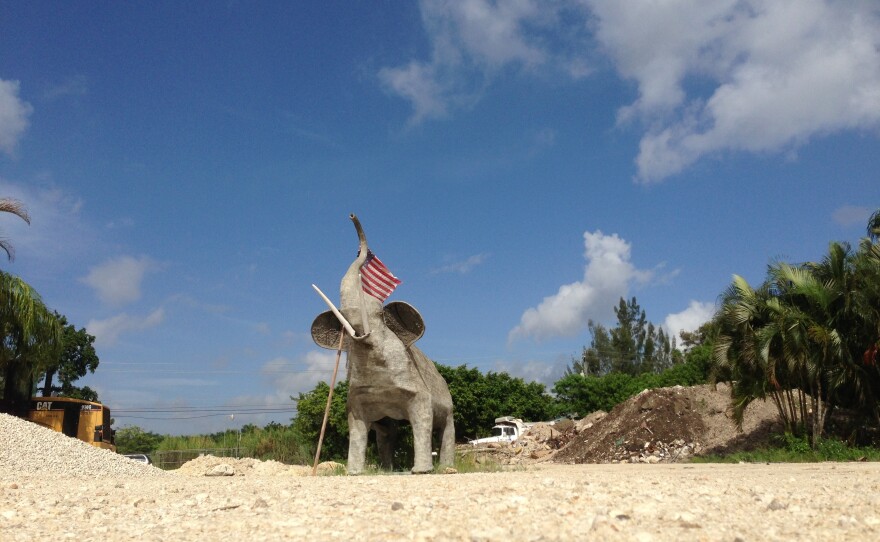With almost exactly forty days and forty nights left in South Florida’s rainy season, now might be a good moment to consider the options.
Globally, four Noah’s Arks have been either completed or started in the last few years.
As of last March, one-tenth of a life-sized ark -- 150-feet worth -- sat just outside Hialeah, part of the $1.5 million Hidden Ark project. (An update on that later.)
Lu’s ark in China, a relatively small boat, was reportedly built to survive the December 21, 2012 apocalypse predicted by the Mayan calendar.
Ark Encounter, a project of the Creation Museum in Petersburg, Kentucky, has already raised more than $13 million of their $24.5 million goal. (The full-size ark alone will cost an estimated $21 million.)
Perhaps the most famous ark builder is Johan Huibers, a Dutch construction company owner who, in 1992, had a dream that part of Holland was terribly flooded.
“And then I said to my wife I’m going to build the ark of Noah,” said Huibers, “And she said, ‘no, no way.’”
Eventually Huiber’s wife came around. In 2011, he completed a 450-foot long, fully-functional ark in the Netherlands.
Tens of thousands of people have come to see Johan’s ark already. The project, he said, is “100%” about his Christian faith. But he thinks the modern appeal of the Noah story is obvious.
“I think because the climate is changing,” said Huibers. “When you see Japan, the tsunami. When you see it in Indonesia. You see the water came in New Orleans... The coming years, there will be a change. The change will be bigger and bigger.”
The Noah’s Ark story has become a kind of a climate change Rorschach test.
Some, like Huibers, see the story as a cautionary tale.
But earlier this year, during a hearing on the Keystone Pipeline, a Texas congressman argued that Noah’s Great Flood was an example of historic climate change that clearly was not man-made.
And in 2009 a congressman from Illinois cited the promise God made to Noah to never again destroy the earth in a flood as a reason we shouldn’t worry too much about climate change.
“Yes [Biblically-founded climate change denial] is a thing. I don't think it's necessarily a major thing,” said Paul Harvey, an expert in American religious history at the University of Colorado. "There's a whole kind of movement around conservative evangelical environmentalism and you actually hear more from them than the climate deniers nowadays.”
Harvey says historically some conservative Christians have viewed everything from the Civil War to the election of FDR through an apocalyptic lens. He thinks the Noah story, regardless of God’s promise, is resonating on that same visceral level.
“Because even if you don’t think there’s going to be a flood,” said Harvey, “evangelicals think there is going to be some kind of catastrophe at the end of the world as part of the book of Revelations. And so they’re still responding to it even if they may deny exactly the climate part of it.”
Climate change, however, is the least of the problems for the Biblically proportioned ark outside of Hialeah. Last June the boat was completely demolished. The group of South Floridians behind the project failed to obtain proper permitting for their Hidden Ark park and the animals they hoped to house on a roughly five-acre lot south of the White Rock Quarries.
At the time of deconstruction, the ark was about one-tenth completed and the group had sunk roughly $300,000 into the build. The entire project would have cost and estimated $1.5 million. (An unsuccessful Kickstarter campaign sought the entire $1.5 million but raised just $825.)
“I’m a little sad,” said Reniel Aguila, one of the project leaders, “but I’m happy because the project continues.”
Aguila said their dreams are now too big for the original land in unincorporated Miami-Dade. The new iteration of the project will be called “Noah’s Ark Park.” Early plans include the ark (they saved all the wood), botanical gardens, a railroad system, a “time machine” ride that takes riders back to Havana circa 1957 and a Niagara Falls-themed water park.
The new estimated cost: $1.2 billion. Aguila said the group is still working on the permitting, location and fundraising. They’ll forgo the Kickstarter campaign this time.
(The 3-D renderings for the Noah’s Ark Park aren’t ready yet. But here’s the animation for the vision of the Hidden Ark park.)










